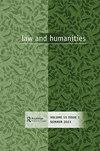当代爱尔兰诗歌中的人权与后人类诗学:技术、媒介、生态
IF 0.2
Q3 LAW
引用次数: 0
摘要
本文考察了当代爱尔兰作家的一系列英语诗歌,并着重探讨了媒体技术在这些诗歌中对后人类伦理和人权问题的影响。人权话语面临着通过后人类伦理和美学来解决“人类”范畴扩大的挑战。因此,我们需要考虑的是,人权的领域或概念如何能够包含罗西·布雷多蒂(Rosi Braidotti)所描述的“后人类知识主体——嵌入、具体化,但又在与人类和非人类他人的关系网络中流动”。这一理论框架为本文所选诗歌的讨论提供了依据,这些诗歌如何在后人类语境中处理人权冲突和侵犯,以及媒体技术的不同表现形式如何塑造和反映这些讨论。诗歌、技术和后人类主体被理解为同样嵌入在物质、文化和政治组合中,人权和后人类伦理也在这些组合中出现。本文章由计算机程序翻译,如有差异,请以英文原文为准。
Human rights and posthuman poetics in contemporary Irish poetry: technology, media, ecology
ABSTRACT This article examines a series of poems by contemporary Irish authors writing in English, and focuses on the role of media technology in considering post-human ethics and human rights issues in these poems. Human rights discourse has faced the challenge of addressing the broadening of the category of ‘human’ through post-human ethics and aesthetics. What is therefore needed is a consideration of how the sphere or concept of human rights can encompass what Rosi Braidotti describes as ‘post-human subjects of knowledge – embedded, embodied and yet flowing in a web of relations with human and non-human others’. This theoretical framework informs the article's discussion of selected poems, how these poems approach human rights conflicts and violations in a distinctively post-human context, and how different manifestations of media technology shape and reflect such discussions. Poetry, technology, and the post-human subject are understood as equally embedded in the material, cultural, and political assemblages within which human rights and post-human ethics also emerge.
求助全文
通过发布文献求助,成功后即可免费获取论文全文。
去求助
来源期刊

Law and Humanities
LAW-
CiteScore
1.00
自引率
0.00%
发文量
21
期刊介绍:
Law and Humanities is a peer-reviewed journal, providing a forum for scholarly discourse within the arts and humanities around the subject of law. For this purpose, the arts and humanities disciplines are taken to include literature, history (including history of art), philosophy, theology, classics and the whole spectrum of performance and representational arts. The remit of the journal does not extend to consideration of the laws that regulate practical aspects of the arts and humanities (such as the law of intellectual property). Law and Humanities is principally concerned to engage with those aspects of human experience which are not empirically quantifiable or scientifically predictable. Each issue will carry four or five major articles of between 8,000 and 12,000 words each. The journal will also carry shorter papers (up to 4,000 words) sharing good practice in law and humanities education; reports of conferences; reviews of books, exhibitions, plays, concerts and other artistic publications.
 求助内容:
求助内容: 应助结果提醒方式:
应助结果提醒方式:


